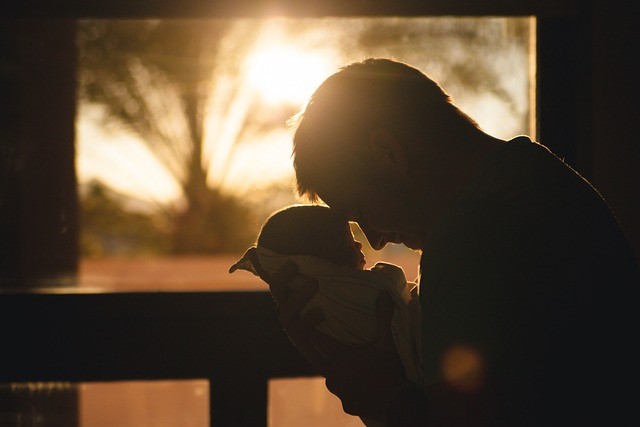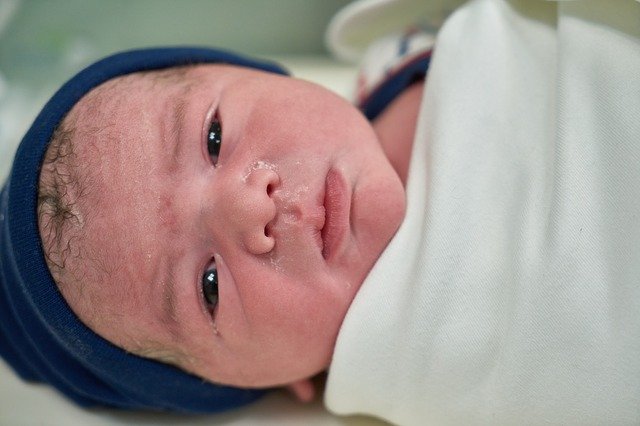If you ask any parent to tell you about the toughest part of their baby’s earliest years, they will usually point towards one thing – a lack of sleep.
Yes, when you have a newborn baby, you can basically kiss goodbye to full nights of unbroken sleep for a while. You may get lucky, your child may be a great sleeper, but for most people, the opposite is true.
What you need to remember is this – your child is growing and developing but they’re also adjusting to the world around them. They’ve spent the first 9 months in the safe and quiet environment of the womb. In the womb, there are no weird noises, no changes in temperature, no wide, open spaces, and nothing else to disturb them. They’re safe, they’re protected, and it’s all your baby has ever known. Suddenly they’re born into a world with more noises and weirdness than they know what to do with and it’s very unnerving.
All of this is bound to affect the way your baby settles, or otherwise!
Of course, during your baby’s sleep they’re also developing and growing. The changes in your baby’s body can be disruptive to their sleep pattern and even though this is a positive thing, it does result in sleepless night and plenty of early hours crying.
There is nothing which can prepare you completely for the first few days, weeks, and months of having a baby. It is a beautiful time, but it’s also a tiring and stressful time too. Because sleep is one of the most commonly referred to issues for newborn parents, let’s look at 5 of the things you much absolutely know about newborns and sleep.
What Happens Whilst Your Baby is Sleeping?
Before we get onto the specifics, it’s very interesting to know what is happening inside your baby’s body whilst they’re sleeping. Yes, sleep helps them to grow in size but sleep is absolutely vital to your baby’s brain development.
The overwhelming majority of the development of their brain happens whilst your baby is sleeping. It might sound strange, considering the fact that they’re not awake, but this type of development doesn’t require consciousness. Whilst your baby is fast asleep. The connections between both sides of the brain hemispheres are developing and forming, eventually connecting together to create the communication lines around the brain. At the same time, millions of neutral connections within the brain are also being developed, creating the all-important synapses.
All of this happens rapidly during your baby’s first days and months but also continues over the first few years too. For that reason, it it’s absolutely vital that your child gets the correct amount of sleep.
5 Things to Know About Newborns And Sleep
Remember, every child is different, but newborns do tend to follow a very specific patterns when it comes to their waking and sleeping hours. Understanding these six key elements will not only help you understand what to expect, but will calm your anxieties in terms of what is normal too.
Item 1 – Newborn Babies Are Often Very Sleepy
Believe it or not, birth can be a pretty traumatic experience. Having left the safe confines of the womb, your baby is now suddenly in a loud and bright room. It’s very normal for a newborn baby to seem very sleepy for the first few days, and it’s to be expected. They also don’t usually want to feed that much for the first few days either. This will changed, so be prepared for milk demand to increase, and as a result, your baby may lose a very small amount of weight after birth, before going on to gain it again, and then some.
If your baby was born before their expected date, it’s very normal for them to be sleepier for longer. If you think about it, it makes sense. However, babies who were born on or after their due date are still sleepy for a few days, but not as much.
Regardless of whether your baby was born before, on, or after their due date, they will need a lot of sleep in the first few days and weeks. A newborn baby needs between 16-20 hours of sleep in total, every 24 hours. Of course, this isn’t a full block of sleeping hours and will be punctuated by waking hours too. This can vary from regular waking to occasional waking, and the pattern may vary from day to day.
Newborn babies may sleep during the night or they may sleep more during the day. There is no hard and fast rule here. Some babies are awake on and off during the day but during the night they allow their parents to get a good amount of shut eye. However, some parents (most if we’re honest) aren’t so lucky and their child is awake on and off throughout the whole night, resulting in broken sleep.
There is nothing you can do about this, it’s simply a fact of having a newborn child!
Item 2 – Newborn Baby Sleep Does Regulate Itself, But Not Immediately
As we’ve already mentioned, there can be zero pattern to when your baby is awake and asleep and this is because they just don’t know the difference between night and day yet. Babies aren’t born knowing that they should sleep at night!
If your baby doesn’t have any pattern to their sleep for the first few days and weeks, take heart in the fact that it’s completely normal. Of course, it’s not comforting when you’re tired and crying out for a full night’s sleep, but it does give you some reassurance that your baby is normal and that there is nothing wrong with them.
There is some good news however. Your baby’s sleeping pattern should start to organise itself a little more as they reach the 6-8 week point. At this time you should be able to work out when your baby is likely to sleep versus when they’ll be awake. There will still be spontaneous occasions when they wake up randomly but these are likely to be less prominent by this point. Around th 6-8 week post, your baby should have a long period of relatively unbroken sleep for around 4-6 hours in length, and it normally happens at the start of the evening, so when you put them down for bed at night. Whilst it might be a little too early for you to go to bed, if you’re tired enough, it’s a good idea to try and get a few hours’ sleep at this point, so you’re more rested and able to deal with any times your baby wakes later in the night. Of course, they will do at some point for feeds.
Item 3 – Newborn Babies Wake up Very Easily!
We’ve already talked about the fact that in the earliest stages of a newborn’s life, they don’t tend to sleep for many hours at a time and often wake up and then sleep again. This is because newborns don’t fall into deep sleep and often stay in the REM or active stages. The bad news? This means that they can wake up very easily. You’ll need to tiptoe a little and keep noise to a minimum in the house otherwise you risk waking up your newborn and having a screaming fit as a result.
The good news is that, as we mentioned, this will tend to even itself out after the first 6 or 8 weeks but before that point you’re going to need to make sure everyone in the house, and anyone who is visiting, understands that once your baby is sleeping, there needs to be very little noise!
The other thing to remember within this item is that when you first have a baby, you’ll have visitors coming to your home to see the little one and wish you well. That’s all very nice, but newborn babies need their sleep! Aside from them waking up at the smallest noise, newborns shouldn’t really be awake for longer than an hour at any one time. If you allow your baby to be left awake longer than an hour at the very most, they’ll become overtired and a nightmare to put down.
Being overtired isn’t something your baby can control either. Newborns needs to sleep so badly that when they’re awake for longer than they could be, the body starts to become stressed and the stress hormone, cortisol, is released. This means the brain is on high alert, looking for threats that aren’t actually there. All of this makes is extremely hard for your baby to relax and fall back to sleep and you’re more likely to have long screaming fits and a lot of stress. This isn’t something your visitors will appreciate, but it’s not something you need at this point either.
It’s very normal for visitors to want to spend awake time with your newborn when they come to visit but be mindful of how long your baby has been awake for and if it’s starting to reach the 45 minute to one hour point, explain that it’s nap time and put them back down to sleep.
Item 4 – You Can Train Your Baby to Sleep in a Routine
A little earlier we mentioned that at around 6-8 weeks of age your baby will start to fall into a sleep routine where they sleep for longer sections of time. However, this is the ideal time for you to start putting them into a regular routine and therefore manipulating the situation to your liking even more!
Many parents assume that their baby will just fall into a routine that suits them, or that they can’t actually start with sleep training until their baby is a little older. This isn’t true. At around 6-8 weeks old your baby is ready and able to receive a little training in this regard and this is the ideal time to start putting forth a few lessons concerning sleep.
By working with the right ideas here you can make the situation easier on yourselves and allow a little more sleep to come your way. You can do this by starting to train your baby to go to sleep a little easier, with a set bedtime. You can start a routine which initiates sleep by soothing your child and allowing them to recognise a cue which means it’s sleep time. This means quiet music, chilled out time, dimmed lights, feeds, and perhaps cuddles.
This particular period is also about trial and error and you’ll find out what your baby likes versus what they dislike in terms of their sleeping routine. You can try to put your baby down into their crib and get them to fall asleep with rocking, quiet music or a mobile overhead, but if that doesn’t work, you can try other things such as sitting beside them and letting them know that you’re close. The only problem with this is that you don’t want your baby to get into the habit of only falling asleep when you’re holding them or very close to them. This is a recipe for a very difficult bedtime routine!
So, whilst you should let your baby know that you’re close by and that you’re soothing them into sleep, holding them whilst they sleep isn’t the best way forward all the time. This will mean that they literally do not fall asleep unless they’re held and babies are quite clever in this regard!
Item 5 – Know How to Put Your Baby Down to Sleep Safely
One of the most worrying thing for parents when it comes to sleep is the risk of SIDS. Sudden Infant Death Syndrome is rare, but it’s something that every parent needs to know about in order to avoid high risk factors. SIDS is often referred to as cot death and it is classified as the sudden death of any baby who is under a year of age. The most common time for this to happen (remember, SIDS overall is rare) is when a child is sleeping.
Nobody wants to think about SIDs but for the safety of your baby you have to be aware of it and know how to put your baby down safely. Yes, SIDS is rare, but that doesn’t mean you shouldn’t pay it the respect it needs.
In order to reduce the risk of SIDs, you should place your baby down to sleep on their back at all times. Never put your baby to sleep on their side or on their stomach. The crib should be firm and you should avoid placing soft toys or anything else inside the crib when your baby is sleeping. Make sure that the room is not too hot and not too cold and it goes without saying that you should letting anyone smoke around your baby.
There is also evidence to suggest that allowing your baby to sleep with a pacifier could also reduce the chances of SIDS by quite a large amount. This is also a soothing tool for your baby so could help them to sleep for longer, without breaks and interruptions.
Final Thoughts
Sleep is something we all miss when we don’t get enough of it. Before you have a baby, you’ll probably not think too much about the fact that you’re going to be tired, simply accepting it as a fact of being a parent. However, when it happens, nothing can prepare you for the feeling of exhaustion! Despite that, having a newborn in you life is one of the most precious and wonderful things and even though you’re tired and would probably do anything for a full night of blissful, unbroken sleep, you wouldn’t change it for the world.
Understanding about newborns and how much sleep they need, as well as what’s going on while they’re sleeping and why they sleep the way they do, will allow you some precious insight into how you can manipulate the situation when your baby is old enough to start having some form of sleep training. At the magic time of 6-8 weeks of age, you can start trying to get your baby into a routine that fits your waking hours far more effectively and perhaps also allows you to get more sleep during the evening too.
Remember, every child is different and whilst it’s complete normal for babies to sleep a lot and wake up a lot too, if you’re worried about anything, you should seek advice to put your mind at rest.
Your doctor, midwife, or health visitor will have heard everything you’re asking before countless times, and will not judge you for asking a question that you might think is silly! There are no ‘silly’ questions when it comes to being a parent and if you’re concerned, asking will alleviate the worry and allow you to focus on helping your child to get the sleep they need, whilst getting the sleep you need at the same time.




